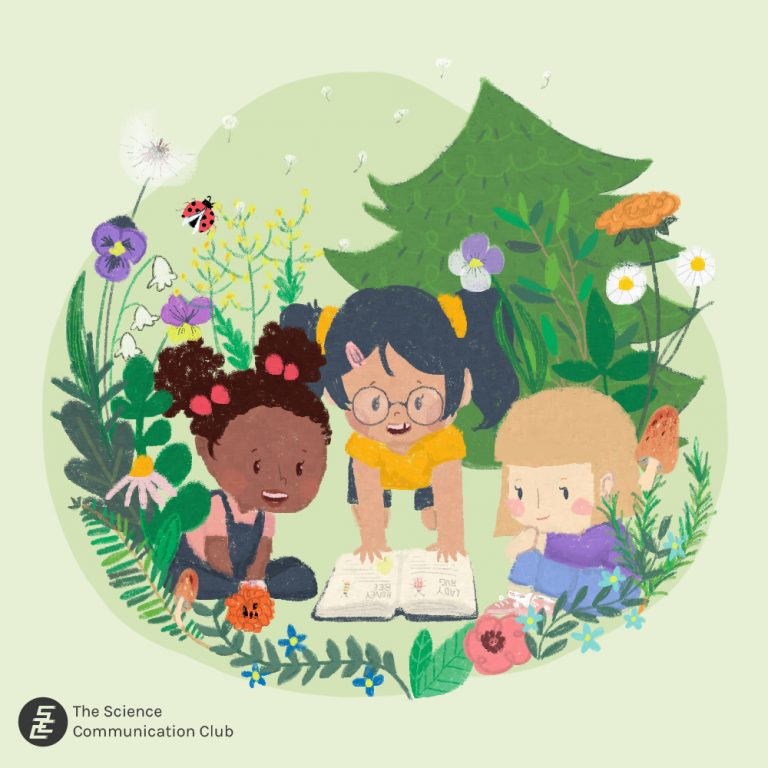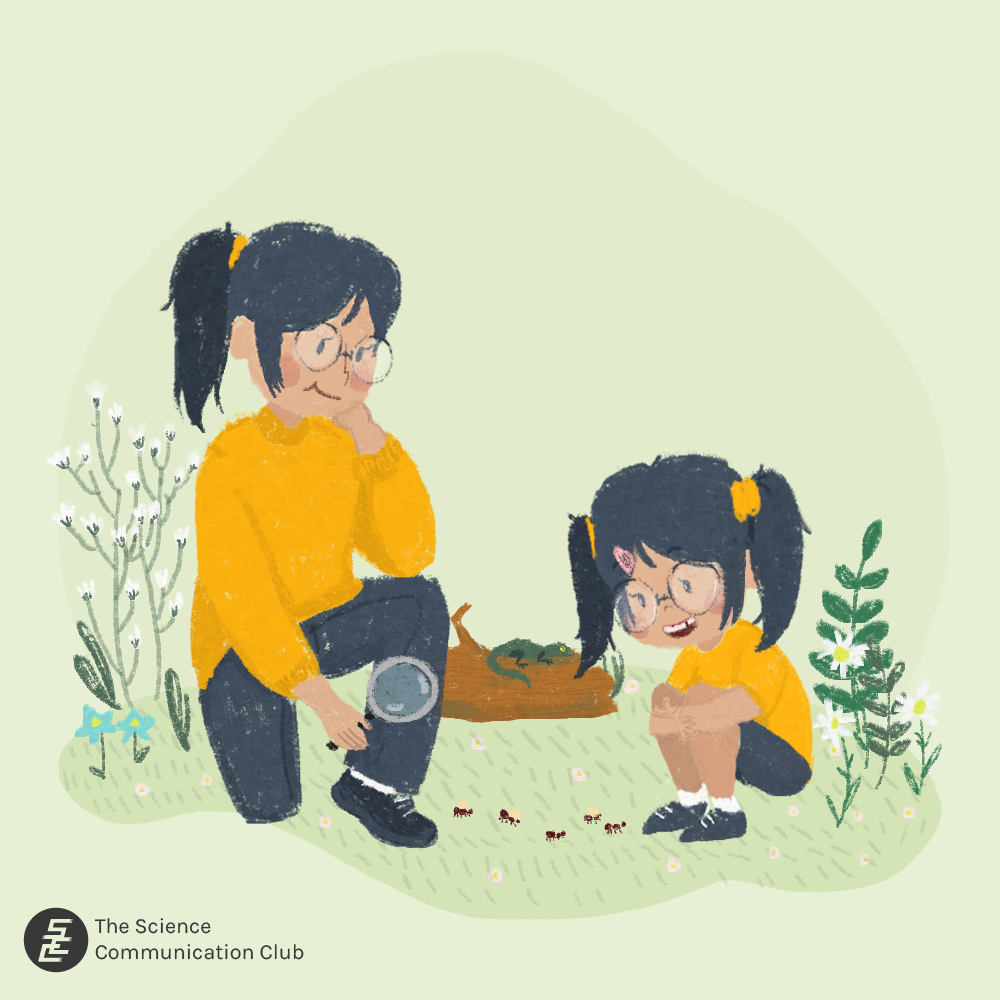
Written by Aaliyah Mulla
Illustrated by Christine Lancion
I was fortunate enough to be able to sit down with Kendra Brown to discuss her journey in the field of science communication. Kendra is a science communicator who has worked in a variety of roles, from teaching a writing course for college students to serving as the editor for Owl magazine and working at the Ontario Science Centre. Here’s what she had to say about her experience:
How did you find your way into the field of science communication?
“It has taken me a long time to find my way here. I don’t have a science background, I didn’t go to school for it. I was lucky to find my way just through my career path”.
Kendra was always interested in science as a kid, particularly in animals and nature. However, science communication wasn’t a field she was aware of before starting her career.
“I don’t think that science communication was something that was as popular or necessary when I first started my career. To be honest, it wasn’t even something that I really knew about. It wasn’t really something that I was shown that I could do”.
Kendra is a UofT alumni, having earned an Honours BA in English Literature and History. After graduation, she describes her journey as “a bit of a long and winding path”, where she worked in publishing, then legal, marketing and advertising, back to publishing, and eventually found her way into science communication.
One of her first jobs in scicomm was as the editor for Owl Kids, a magazine that, under Kendra’s direction, has become a STEM-focused magazine for youth. “That is where I really came back to my first love, of animals and nature, and science.” She describes her career at Owl as a time where her love for science was reinvigorated: “I realised how much I loved…being able to inspire that love and curiosity in kids and young people”.
As for her career journey, Kendra wants people to know that “it is non-linear, or it can be for a lot of people. And it is very much a path or journey with lots of stops along the way and corners that you can turn and then maybe go back a little bit again, and that’s absolutely ok. You know, most of us do find our way at some point but I’m really happy [with] where I’ve ended up. Everybody has their own way to get to that place in their career”.
What’s it like being a science communicator without advanced science knowledge? Do you think it poses any unique challenges or advantages?
“It can be a little intimidating sometimes…however I’ve always been a big believer that there is an advantage to not having that education, or background, or knowledge”. I think that there’s something about learning along the way and researching yourself, something that you don’t know that much about. You’re sometimes able to tell it—or often able to tell it, in a way that others can understand more easily. And that’s the whole thing about science communication, it’s communicating science in a way that will engage and spark curiosity and wonder in other people”.
Kendra says this can be particularly advantageous when writing for younger audiences.
“When I’m learning about something, I’m often learning with them, and I can explain it in a way that’s easier to understand. I’m having to wrap my head around the concepts at the same time, and learn how to explain them. So I actually see it generally as an advantage, because I’m not coming at it with all of this knowledge. (…)I’m coming at it at a level as pretty much the same as everybody else”.
“People say write what you know, but there’s also the term ‘write what you wonder’, and I really love that, write what you wonder. And I really believe in that and I think that’s how I go about my career, [by] writing about (…) things that I wonder, as well as that I may not know that much about.”
You can read about some of Kendra’s wonderings on her blog, where she describes cool science facts in fun, short articles.
What are your favourite and least favourite parts about your job?
Kendra says she really likes “lots of variety, and learning about new and different things everyday”.
She loves “tackling a new topic, a new challenge,” or “writing for a different audience”.
This variety is something she loves about her current role at the Ontario Science Centre, where she’s able to write about a range of topics for different audiences and work many different types of projects. “That’s something that’s really important to me and something I really enjoy…learning as much as I can!”
However, no job is perfect, and of course there will always be small things we don’t like about a job. One of those is something many of us can relate to. “There are always sometimes subjects that I don’t love that I have to write about…because I don’t always get to pick what I write about…math is still something that I really struggle with”
However, even with math-heavy articles, Kendra views the experience as a challenge. “I always feel better about [it] after having worked through it”.
Another challenge Kendra sometimes faces is writer’s block. “It’s a real thing”.
Overall though, Kendra says, “I generally love what I do and I think I’m very lucky every day to have found myself having this job”.
What one skill would you say has been the most important for your work?
Kendra has a package of three top skills that she says have been the most important for her: curiosity, creativity, and kindness. She acknowledges that they might seem more like characteristics than skills, but explains they can also be skills “you can hone a little bit”, especially as an adult.
“It can be hard to stay curious as an adult. We’re all curious when we’re younger, but that can kind of get you know snuffed out a little bit. So that has been something that I’ve been able to bring back and now maintain as an adult in my work and I think that that has really helped me (…) because it means that I’m always (…) asking questions and wanting to know more or learn more”.
“And creativity for sure…again another one that a lot of us have as kids but as we get older(…), even when we go into creative fields(…) has the potential to get a little bit squashed”.
“You have to be creative when you’re communicating scientific topics…depending on who your audience is…and to stand out. Creativity is part of helping you stand out as well in the field”.
Kindness is a skill that Kendra really emphasised to the students in her college writing course. “I probably talked about it too much, but I often(…) talked about the skill, or being a kind person [in your work]”. She explains that kindness is so important because a big part of science communication involves working with other people, whether it’s working with colleagues or interviewing people for articles.
“To be kind and understanding and a good person to work with is so incredibly helpful, and that’s a big part of why I’ve gotten jobs, I think, is just that I am kind…I’m kind and I’m a good person to work with. And I will say that about myself. I’m fun to work with and I love working with other people and I think [in science communication], that’s a really important asset to have.”

Kendra says that these are skills and values that weren’t emphasised much when she was at school, but through her career she has realised how important they are. She’s really glad that now teachers and educators are focusing on them as 21st-century learning skills.
You’ve done a lot of scicomm for children. Is there anything you think is important to keep in mind when writing for children?
“Language. [It is] I think one of the biggest things… When you’re describing concepts, you want to introduce them to the terminology, but sparingly. You really have to keep in mind reading level and comprehension. But also bearing in mind that every kid is different”.
This is something she had to consider when writing her book Small but Mighty, which is aimed at 7-10 year-olds.
“The reading level of a 7-year-old can be very different to that of a 10-year-old, or even two different ten-year-olds. So there is a range”.
“It’s also a very fine balance between too little and too much information”.
When introducing people to higher-level concepts and new terminology, Kendra finds that “glossaries can be very handy.”
Kendra also says that humour can be an effective tool for engaging young people, but she also thinks sometimes science concepts are so amazing that you don’t even need humour to spark interest.
She also says it’s important to consider the way you address young people in writing. “Talk to them, not at them…Kids don’t ever want to feel like they’re being talked down to, or talked at”.
Do you have any advice for people just starting out as science communicators, or who might be interested in getting into the field?
“I think the best advice I could probably give is to just give yourself time to find your path. And I know that the competition is really tough, and I know that there’s a lot of pressure out there. And we can often feel in a big rush to get there, to figure everything out and be the best, but what I want people to know is that it’s ok, and there is actually no real rush and just to take your time. It’s that whole thing of just taking a breath and just trying to remember that you have lots of time and you’re going to figure it out, and to follow your gut, your passions, what inspires you.”
“And of course, not all the time. Sometimes you’re going to have to take jobs that you may not be that passionate about, or opportunities or internships or whatever it is. But if you think that it’s going to potentially lead somewhere—sometimes you just don’t know. I think being open to opportunity and being open to change, and being open to going on different paths is also part of it.”
Which brings us right back to the beginning of our chat. “It’s not always linear…and that’s absolutely ok.”
“It’s about being open and exploring and just enjoying the journey you’re on, which is what science is always about too, right? It’s asking questions, and trying to find answers. But often you end up asking more [questions] along the way, and you might veer off a little bit to figure out one answer and then you go back the other way to find another. I think sometimes if you think of your journey like a little science adventure then that can help as well.”
“I just want people to take the pressure off themselves if they can…I know there is so much pressure out there, but there’s also a lot of really wonderful people and opportunities and things to enjoy and you’ll get there. You’ll get there and you’ll figure it out.”
She also emphasised the importance of being open to new experiences.
“In science communication you’re going to have to be communicating [such a big variety] of topics and concepts, so the more open you can be to just learning and taking in the world, that’s just going to serve you so much better. To not define yourself as being an expert in one area (…) can be helpful too. And that’s why taking any opportunity and experience you can to learn and grow is going to be really helpful for your career, particularly as a science communicator.”